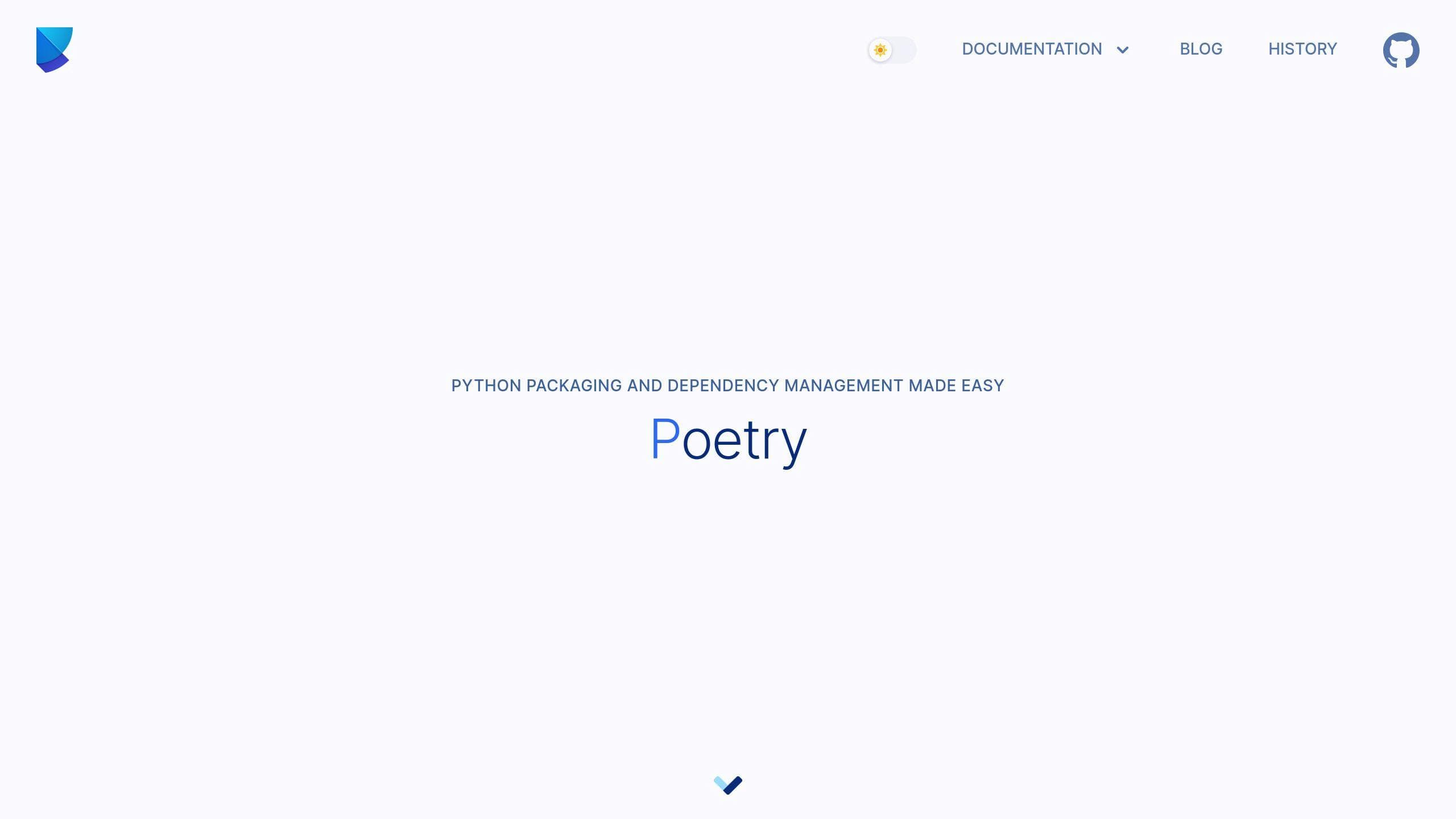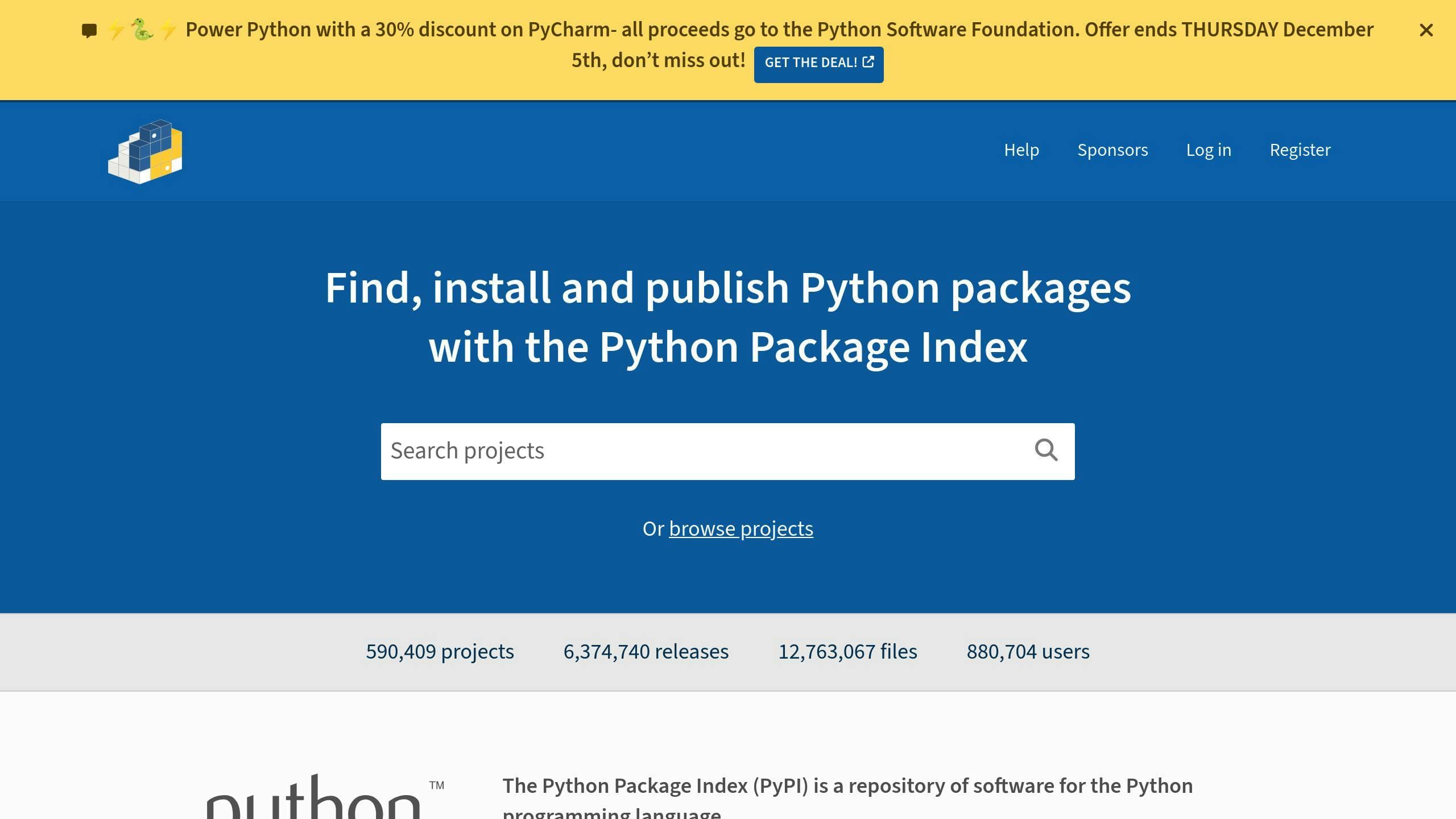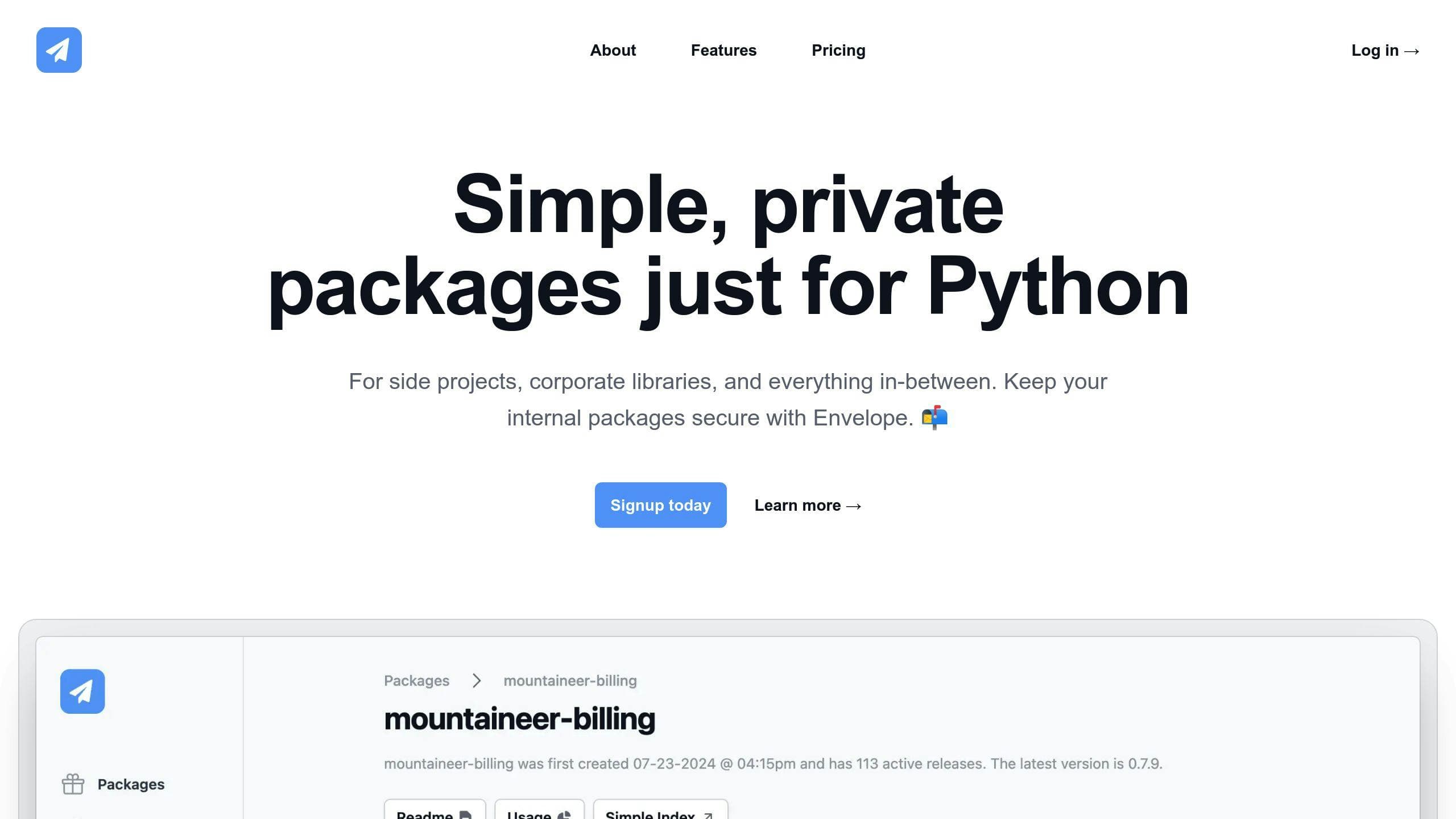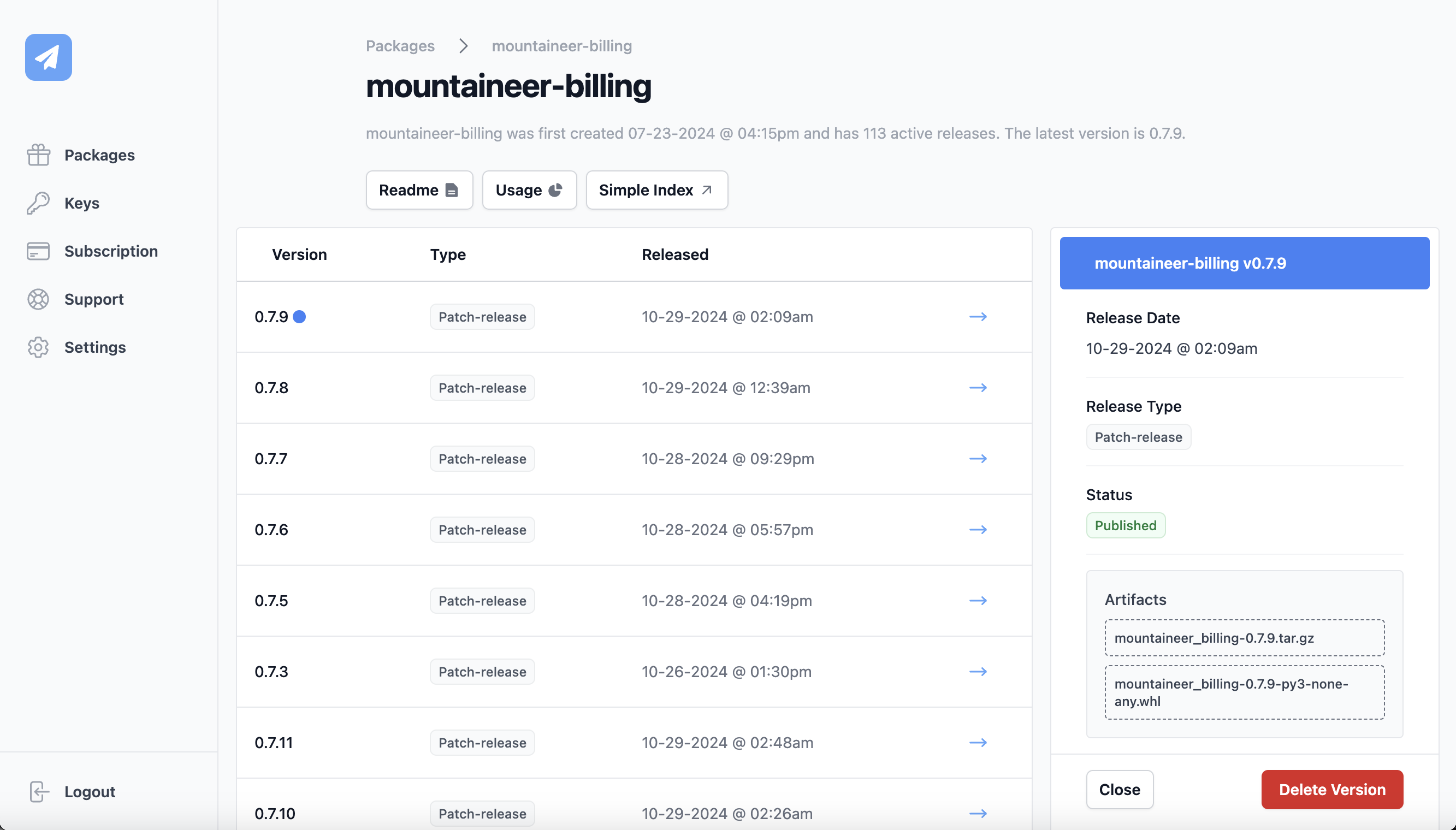
Solving Common Python Package Distribution Issues
Python package distribution can be tricky, but understanding the key challenges and solutions can make it manageable. Whether you're dealing with dependency conflicts, securing private packages, or ensuring smooth delivery, there are proven tools and practices to help. Here's what you need to know:
- Common Issues: Dependency conflicts, security risks, and managing private repositories.
- Key Tools: Use
setuptools,Poetry, and private PyPI servers for better control. - Solutions:
- Set up private PyPI servers for secure proprietary package hosting.
- Use tools like
pip-toolsandPoetryto resolve dependency conflicts. - Consider managed services like Envelope for easier private package management.
Quick Comparison:
| Feature | Private PyPI Servers | Envelope |
|---|---|---|
| Setup Complexity | Manual setup required | Automated, easy to start |
| Maintenance | Self-managed | Fully managed |
| Cost | Infrastructure costs only | Starts at $5/month |
| Security Features | Basic authentication | Advanced controls, audit logs |
Key Takeaway: For most teams, managed services like Envelope simplify distribution and enhance security, while private PyPI servers offer full control for those with technical expertise.
Python Poetry in 8 Minutes

Basics of Python Package Distribution
Understanding the fundamentals of Python package distribution helps address issues like dependency conflicts and secure code delivery.
What Does Python Package Distribution Involve?
Python package distribution means organizing your code into a structured format that includes key metadata like the package name, version, and dependencies. This metadata is typically defined in files like setup.py or pyproject.toml to ensure proper installation and functionality.
| Distribution Type | Best Use Case |
|---|---|
| Source (sdist) | Ideal for open-source projects; requires building |
| Wheel | Pre-built for faster installations |
| Local | Best for development or testing environments |
Once your package structure and metadata are in place, the next step is to use the right tools to simplify the distribution process.
Tools Used in Python Package Distribution
Tools like pip manage the installation of packages from repositories such as PyPI, the central hub for Python packages. Essential tools include setuptools for building and managing packages, and Poetry, which makes dependency management and packaging easier, especially for complex projects.
For secure distribution, developers can rely on private PyPI servers or dedicated services. This is particularly useful for organizations handling proprietary code or needing control over internal distribution processes.
Here's an example of a typical package structure:
my_package/
├── __init__.py
├── module1.py
├── module2.py
├── pyproject.toml # or setup.py
└── README.md
This layout ensures your package is well-organized and ready for distribution. Stick to best practices like semantic versioning, maintaining one repository per library, and using wheel distributions for quicker installations.
While these tools and practices streamline the process, challenges like dependency conflicts and secure delivery still require thoughtful planning.
Challenges in Python Package Distribution
Python package distribution comes with its own set of hurdles, including dependency conflicts, security risks, and managing private repositories. These issues can derail workflows and delay projects if not handled properly.
Issues with Dependency Conflicts
Dependency conflicts happen when packages rely on different, incompatible versions of the same dependency. This can cause instability in projects, especially in larger, more complex setups.
| Conflict Type | Impact | Common Solution |
|---|---|---|
| Version Incompatibility | Project instability | Use virtual environments |
| API Changes | Breaking changes | Pin specific versions |
| Transitive Dependencies | Hidden conflicts | Dependency resolution tools |
Tools like pip-tools and Poetry help address these conflicts by simplifying dependency management. Properly handling these issues ensures smoother development and more stable environments.
Problems with Secure and Fast Package Delivery
Security and delivery speed are major concerns when distributing Python packages. Traditional methods often fall short in addressing these challenges.
Key problems include:
- Verifying package integrity
- Handling slow download speeds for large packages
- Keeping builds consistent across environments
- Protecting proprietary code from unauthorized access
While wheels have improved download speeds, ensuring package integrity and securing proprietary content remain ongoing challenges. For organizations with sensitive code, private repositories are a common solution, though they come with their own complexities.
Difficulties in Managing Private Package Repositories
Private repositories introduce unique challenges, especially for larger teams or more intricate operations.
Teams often struggle with issues like access control, applying security updates, and ensuring reliable storage. As organizations grow, these problems become harder to manage, making it essential to find efficient solutions for internal development workflows.
Solutions to Python Package Distribution Problems
Dealing with Python package distribution issues often requires the right mix of tools, configurations, and practices. Here’s a breakdown of practical steps to improve your package distribution process.
Setting Up Private PyPI Servers

Using pypiserver is a straightforward way to create a private PyPI server. Start by installing the necessary tools:
pip install pypiserver passlib
Next, set up authentication with .htpasswd and configure your pip to point to your private repository. This setup ensures secure and controlled access to proprietary packages.
To make your pip configuration work seamlessly, create a simple configuration file specifying the repository URL and credentials. While private PyPI servers are effective, modern tools like Envelope can make private package hosting even easier.
Leveraging Envelope for Private Package Hosting

Envelope offers a user-friendly, PEP 503-compliant platform for hosting private packages. It supports customizable access levels for teams, provides up to 10GB of storage, and integrates smoothly with tools like pip and Poetry. This makes managing dependencies and addressing security concerns much simpler.
Envelope’s features are designed to tackle common distribution challenges, offering a more streamlined and secure approach to private package hosting.
Best Practices for Reliable Package Distribution
Adopting effective practices is key to ensuring smooth deployment and long-term maintenance of your packages. Here are some strategies to consider:
- Version Control: Use semantic versioning to avoid dependency conflicts and maintain compatibility across environments.
- Organized Package Structure: Keep your package structure clear and include proper initialization files to make distribution easier.
- Thorough Testing: Always test your package before distribution. For example:
pip install -e .
python -m build
twine check dist/*
Comparing Private Package Distribution Options
Choosing the right private package distribution method is essential for tackling challenges like security, scalability, and ongoing maintenance. The right option depends on your team's specific needs and resources.
Private PyPI Servers vs. Envelope
Private PyPI servers and Envelope offer two different ways to manage private Python packages. Envelope simplifies the process with automated setup, while private PyPI servers demand a more hands-on approach.
| Feature | Private PyPI Servers | Envelope |
|---|---|---|
| Setup Complexity | Requires manual setup and expertise | Automated and easy to use |
| Infrastructure Cost | Only infrastructure costs apply | Starts at $5/month (Basic plan) |
| Maintenance | Needs manual management | Fully managed by the provider |
| Storage Capacity | Limited by your infrastructure | 1GB-10GB, depending on the plan |
| Bandwidth | Depends on your infrastructure | 10GB-100GB per month |
| Security Features | Basic authentication, HTTPS | Advanced features like access controls, audit logs, and time-limited keys |
| Scalability | Manual scaling required | Includes automatic scaling |
| Integration | Manual CI/CD setup | Built-in webhooks and API support |
"Private repositories ensure consistent dependencies."
If you're working with a tight budget and already have the necessary infrastructure and expertise, private PyPI servers might be a cost-effective choice. However, they require ongoing upkeep. On the other hand, Envelope's Professional plan ($15/month) offers 10GB of storage and reduces maintenance efforts significantly.
Here’s a quick guide to help your team decide:
| Private PyPI Servers | Envelope |
|---|---|
| Best for teams with strong technical expertise | Ideal for teams looking to save time on setup and upkeep |
| Suitable for those needing full control over infrastructure | Great for teams needing advanced security features |
| Works well for strict data locality requirements | Perfect for scalable storage and bandwidth needs |
| A good fit if you already have infrastructure in place | Designed for automated dependency management and versioning |
For most modern development teams, the ease and reliability of managed services like Envelope often outweigh the potential cost savings of self-hosted solutions.
Improving Python Package Distribution
Distributing Python packages effectively comes down to using the right tools and following best practices. It's all about maintaining standardization, ensuring security, and keeping things easy to manage. Tools like setuptools and Poetry make creating and managing packages much simpler.
"Standardized tools and practices, such as those outlined in the Python Packaging User Guide, are essential for streamlining package creation and distribution."
The introduction of pyproject.toml has made metadata configuration more straightforward and consistent across projects. The Python Packaging User Guide highlights how crucial proper metadata and secure distribution channels are for successful package management.
When dealing with cross-platform distribution, you might need to address specific system requirements, like those in Linux environments. Clear and accessible documentation - whether through README files, wikis, or inline comments - makes packages easier to understand, use, and expand.
Looking ahead, automation, security, and efficiency will shape the future of Python package distribution. Whether you opt for self-hosted solutions or managed services, the focus should always be on tools and practices that meet your team's needs while prioritizing security and reliability. Tackling dependency conflicts, securing delivery processes, and managing private repositories effectively can help developers navigate common challenges and maintain seamless workflows.
FAQs
Here are answers to some common questions about hosting private Python packages.
How do you set up a private PyPI server?
You can set up a private PyPI server by creating a secure directory for your packages, enabling authentication, and configuring pip to point to your server. Tools like pypiserver simplify this process, making it easier to securely host and manage your proprietary packages.
Is it possible to create private Python packages?
Absolutely. You can create private Python packages using private PyPI servers or managed hosting services like Envelope. Private servers give you full control but require manual configuration and upkeep. On the other hand, services like Envelope handle hosting for you, offering built-in security and scalability.
Can PyPI be private?
Yes, you can host private PyPI servers on platforms like AWS EC2 or opt for managed services such as Envelope. Managed solutions like Envelope simplify the process, offering advanced security and scalability. Hosting your own server requires more effort but provides complete control.
"Standardized tools and practices, such as those outlined in the Python Packaging User Guide, are essential for streamlining package creation and distribution."
Whether you use private servers or managed services, solving distribution challenges is crucial for secure and efficient workflows.
Easy, private Python packages.
Stop worrying about authorizing git clones, manual indexes, or expensive solutions. Envelope makes hosting private packages as easy as publishing to pypi.
